If you’re looking for the best Bluetooth OBD adapters for simple car diagnostics in 2025, I’ve checked out top options like Veepeak, Vgate, and OBDLink, which support a wide range of vehicles, from US cars post-1996 to BMWs and more. They offer features like live data, trouble code reading, and quick wireless connections. If you want to find out which one fits your needs perfectly, keep exploring further details below.
Key Takeaways
- The list highlights top Bluetooth OBD adapters supporting vehicles from 1996+ with various protocols and device compatibility for comprehensive diagnostics.
- It emphasizes features like fast Bluetooth connections, stable data transfer, and user-friendly design suitable for DIYers and professionals.
- Compatibility details include support for OEM modules, advanced functions like coding, live monitoring, and app integration for enhanced vehicle troubleshooting.
- Considerations such as build quality, firmware stability, and additional costs for full feature access ensure informed purchasing decisions.
- The guide caters to different user needs, from basic fault code reading to OEM-level diagnostics, coding, and specialized vehicle support in 2025.
Veepeak OBDCheck BLE+ Bluetooth OBD II Scanner for iOS & Android
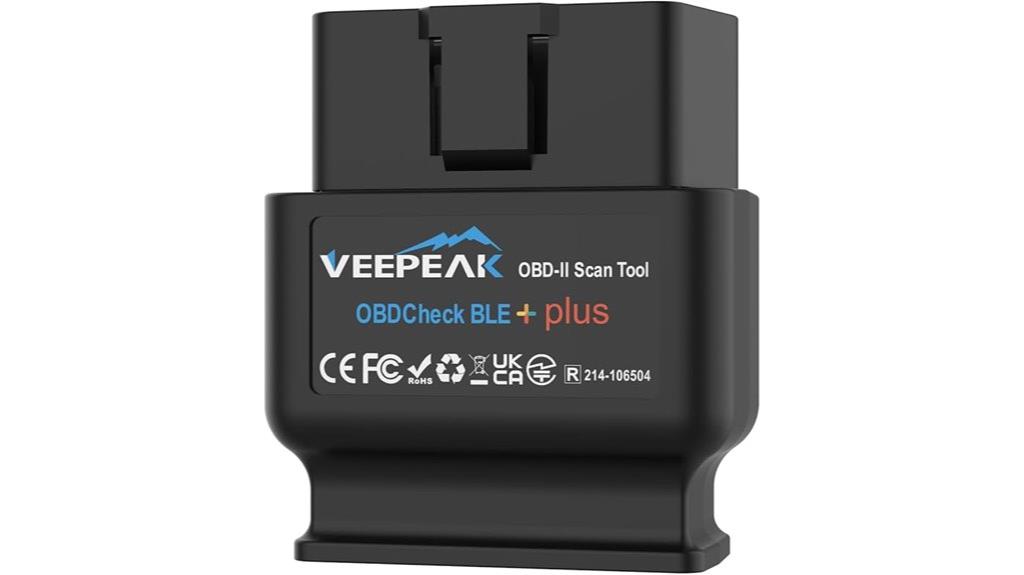
If you’re looking for an easy-to-use, reliable Bluetooth OBD II scanner compatible with both iOS and Android devices, the Veepeak OBDCheck BLE+ is an excellent choice. I found it straightforward to set up and connect via Bluetooth LE on my iPhone, and it works well with popular apps like Car Scanner and OBD Fusion. It supports all US cars since 1996, providing essential diagnostics such as trouble codes, live sensor data, and I/M readiness. While advanced features like ABS and SRS depend on your vehicle and app, it’s great for quick checks and basic maintenance. Its compact size and one-year warranty make it a reliable, budget-friendly tool.
Best For: DIY car enthusiasts and hybrid vehicle owners seeking an easy-to-use, reliable Bluetooth scanner compatible with both iOS and Android devices for basic diagnostics and maintenance.
Pros:
- Easy setup and reliable Bluetooth LE connection on iOS and Android devices
- Supports a wide range of diagnostics including trouble codes, live data, and I/M readiness
- Compact design with a one-year warranty offers good value and portability
Cons:
- Advanced diagnostics like ABS, SRS, and manufacturer-specific codes depend on vehicle and app compatibility
- Limited to basic functions; service reset not supported
- Compatibility issues may arise with certain vehicle models or older cars, especially BMW or pre-2008 models
Veepeak OBDCheck BLE Bluetooth OBD II Scanner Car Code Reader
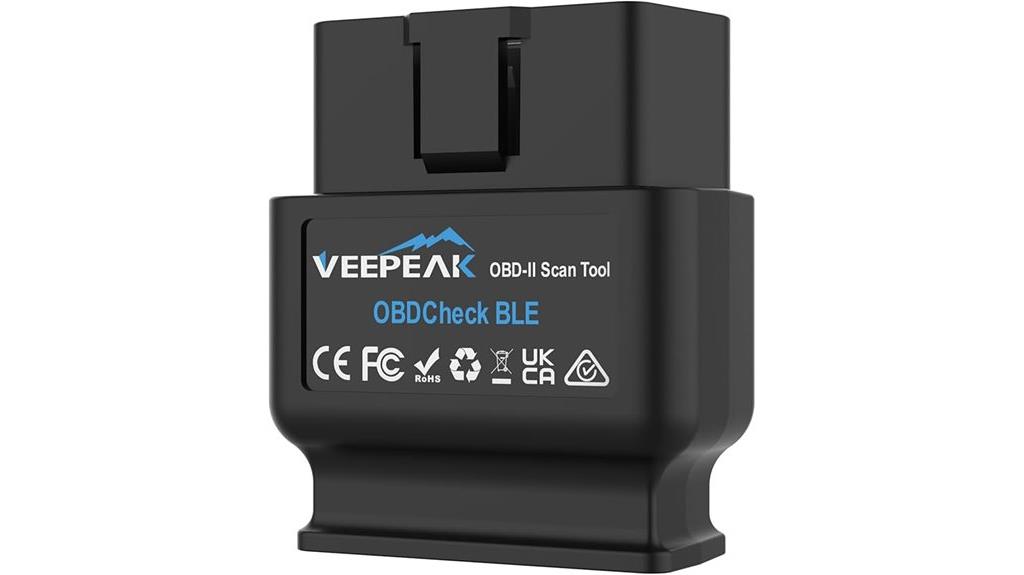
The Veepeak OBDCheck BLE Bluetooth OBD II Scanner is an excellent choice for DIY enthusiasts and car owners who want reliable diagnostic tools without professional help. It helps identify check engine light reasons, read and clear trouble codes, and monitor vehicle performance. The device offers freeze frame data, live data, and I/M readiness status, with advanced diagnostics like ABS, SRS, and TPMS available on certain vehicles through specific apps. Compatible with most 1996+ cars and light trucks, it connects via Bluetooth LE on iOS and Classic Bluetooth on Android. While it doesn’t support service resets, it’s a versatile, easy-to-use tool for everyday diagnostics.
Best For: DIY car enthusiasts and everyday vehicle owners seeking reliable and easy-to-use Bluetooth diagnostic tools for most 1996+ cars and light trucks.
Pros:
- Compatible with a wide range of vehicles (1996+ US, 1998+ Canada) and supports various popular OBD apps.
- Supports Bluetooth LE on iOS and Classic Bluetooth on Android for seamless connectivity.
- Provides comprehensive diagnostic data including trouble codes, freeze frame, live data, and advanced functions on supported vehicles.
Cons:
- Does not support service reset functions.
- Advanced diagnostics like ABS, SRS, and extended data are only available for select vehicles via specific apps.
- Compatibility with EVs, PHEVs, and pre-2008 BMW models is limited or requires additional app support.
Vgate iCar Pro 2S Bluetooth OBD2 Car Scan Tool

Looking for a reliable Bluetooth OBD2 scanner that seamlessly connects to your smartphone or tablet? The Vgate iCar Pro 2S is a top choice, supporting iPhone, Android, and Windows devices. It works with most OBD2-compliant vehicles sold in the USA, including electric and hybrid models. Featuring Bluetooth 5.2, it offers fast data transfer up to 3Mbps and easy app compatibility with Torque, Car Scanner, and others. Its low power consumption, compact design, and simple setup make it ideal for casual users and mechanics alike. Plus, firmware updates and strong connectivity guarantee reliable diagnostics for a variety of vehicles.
Best For: casual car owners, DIY enthusiasts, and professional mechanics seeking a reliable, easy-to-use Bluetooth OBD2 scanner compatible with various vehicles and devices.
Pros:
- Supports multiple platforms including iPhone, Android, and Windows with easy app integration.
- Fast Bluetooth 5.2 data transfer up to 3Mbps ensures quick diagnostics.
- Low power consumption with auto sleep and wake-up features helps preserve vehicle battery life.
Cons:
- Compatibility issues or limited functionality with certain Android phones or specific apps.
- Possible connection problems or firmware update failures, especially with clone units.
- Some advanced features, such as tire size adjustments or detailed EV data, may require additional paid app upgrades.
X1 OBD2 Scanner Bluetooth for iPhone & Android
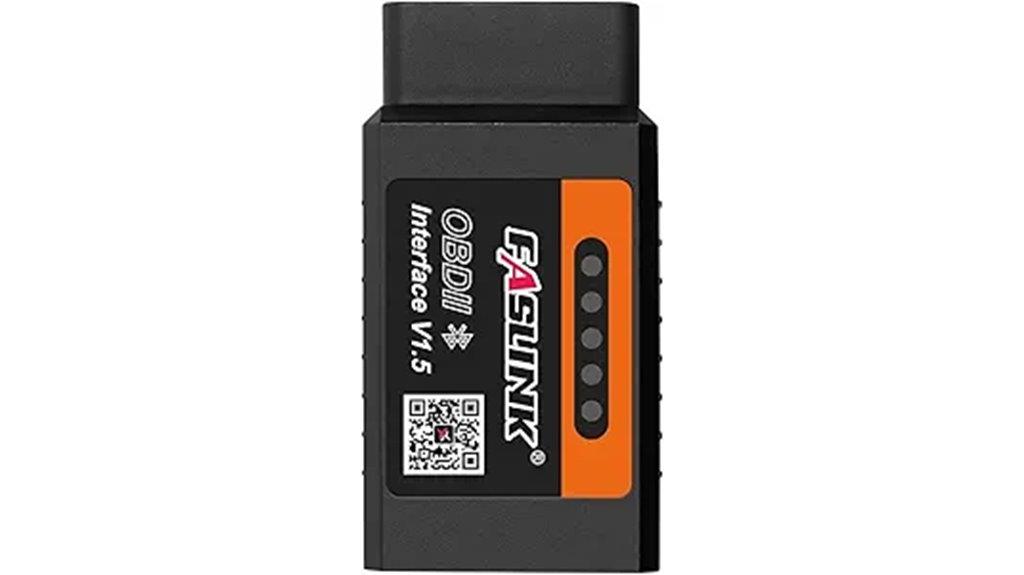
The X1 OBD2 Scanner Bluetooth is an excellent choice for car owners who want quick, reliable diagnostics using their smartphones. Its Bluetooth 4.2 guarantees a stable connection with a range of 30-50 meters outdoors. Compatible with both iPhone (iOS 10.0.5+) and Android (5.5+), it supports full OBDII protocols, including J1850 and ISO9141. Plug-and-play design makes setup simple—just connect, open FASLINK X software, and start diagnosing. It reads and clears fault codes, resets check engine lights, and offers real-time data. Whether you’re a beginner or experienced DIYer, this adapter makes vehicle diagnostics fast, easy, and wireless.
Best For: DIY car owners and enthusiasts seeking quick, reliable wireless diagnostics on iPhone or Android devices.
Pros:
- Seamless Bluetooth 4.2 connection with up to 50 meters range outdoors.
- Compatible with most vehicles manufactured since 1996, supporting full OBDII protocols.
- User-friendly plug-and-play setup suitable for beginners and experienced users alike.
Cons:
- Requires FASLINK X software for optimal functionality, which may need downloading and setup.
- Limited to smartphones with iOS 10.0.5+ or Android 5.5+; older devices may not support it.
- May not diagnose complex or advanced vehicle issues beyond basic OBDII functions.
OBDLink CX Bimmercode Bluetooth 5.1 OBD2 Adapter for BMW/Mini
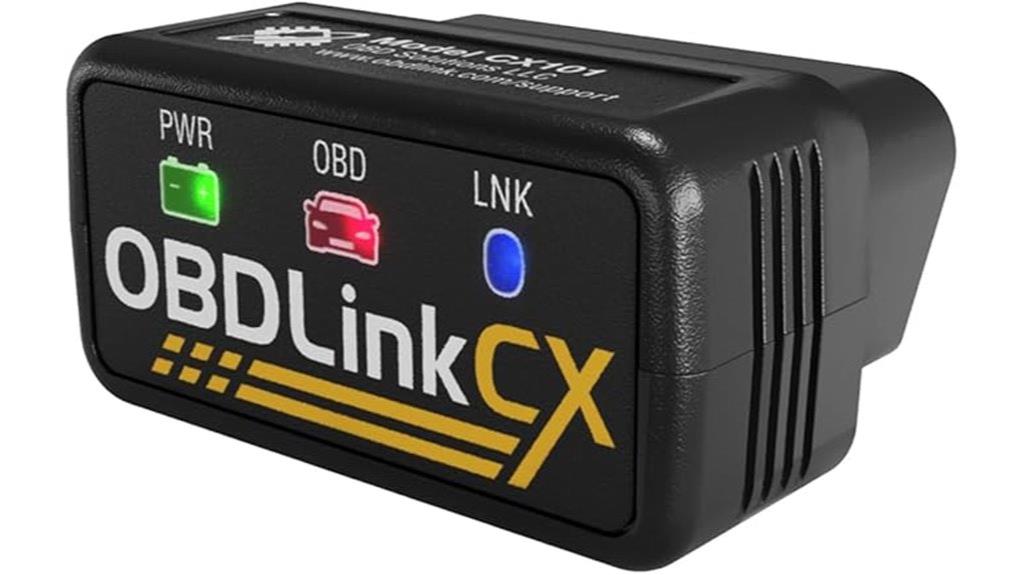
If you own a BMW or Mini and want a reliable, easy-to-use diagnostic tool, the OBDLink CX Bimmercode Bluetooth 5.1 Adapter is an excellent choice. It offers full vehicle protocol coverage, supporting coding, diagnostics, and live monitoring via compatible apps like BimmerCode and BimmerLink. The device connects quickly and stays stable with Bluetooth 5.1, making it perfect for both casual and professional use. Its compact design allows it to remain plugged in without draining your battery, and advanced sleep mode guarantees energy efficiency. Whether you’re customizing features or troubleshooting, this adapter delivers speed, reliability, and versatility across BMW, Mini, and even some non-BMW vehicles.
Best For: BMW and Mini owners seeking a reliable, easy-to-use diagnostic and coding tool for vehicle customization, troubleshooting, and live monitoring.
Pros:
- Supports full vehicle protocol coverage for coding, diagnostics, and monitoring.
- Quick, stable Bluetooth 5.1 connection with no dropouts, suitable for extended use.
- Compact, durable design that can remain plugged in without draining the battery, thanks to advanced sleep mode.
Cons:
- Requires separate purchase of the BimmerCode app for coding functions.
- Compatibility may vary with non-BMW vehicles, limiting full feature access on some models.
- Being manufactured in China, some users may have concerns about regional support and warranty services.
OBDLink MX+ OBD2 Bluetooth Scanner for iPhone, Android, and Windows

The OBDLink MX+ Bluetooth scanner is an excellent choice for car enthusiasts and professionals who need reliable, OEM-level diagnostics across multiple vehicle brands. It transforms iPhone, Android, and Windows devices into powerful diagnostic tools, supporting extensive OEM modules like ABS, SRS, and TPMS. The device offers fast, deep scans—initial checks take just a few minutes—and can clear check engine lights. Compatible with popular apps like FORScan and Torque, it provides detailed data without extra costs. Compact and lightweight, the MX+ is built with safety features like over-voltage protection and firmware updates, making it a versatile, high-performance diagnostic device.
Best For: car enthusiasts and professional mechanics seeking OEM-level diagnostics with fast, comprehensive vehicle module access across multiple brands using their smartphones or Windows devices.
Pros:
- Supports extensive OEM modules including ABS, SRS, TPMS, and more for detailed diagnostics
- Fast deep scans with the ability to read and clear codes efficiently
- Compatible with popular diagnostic apps like FORScan, Torque, and others, providing versatile usage
Cons:
- Higher price point compared to basic generic scanners, which may be a concern for some users
- Requires compatible devices and apps for full functionality, possibly involving additional costs
- Hardware is inexpensive, but some users find the software capabilities and OEM-specific features justify the higher cost
Veepeak Mini Bluetooth OBD II Scanner for Android

Designed specifically for Android users, the Veepeak Mini Bluetooth OBD II Scanner offers a compact, affordable solution for diagnosing vehicle issues without needing a wired connection. It supports cars from 1996+ in the US and 1998+ in Canada, providing essential functions like reading trouble codes, freeze frame data, and live sensor readings such as RPM, coolant temperature, and oxygen sensors. While it doesn’t work with Apple devices, it pairs seamlessly with many Android apps like Torque and OBD Fusion. Note that some advanced diagnostics, especially manufacturer-specific data, may be limited. It’s a reliable, user-friendly tool for quick, on-the-go vehicle insights.
Best For: Android vehicle owners seeking an affordable, portable, and easy-to-use diagnostic tool to quickly identify engine issues and monitor real-time sensor data.
Pros:
- Compatible with a wide range of Android apps like Torque and OBD Fusion for versatile diagnostics
- Supports vehicles from 1996+ (US) and 1998+ (Canada), covering most modern cars
- Compact, wireless design allows for convenient on-the-go diagnostics without cables
Cons:
- Not compatible with Apple iOS devices, limiting use to Android only
- Advanced diagnostics such as manufacturer-specific data may be limited or unavailable
- Unsupported on Android head units and some EV or PHEV models might have limited functionality
Vgate iCar Pro Bluetooth OBD2 Fault Code Reader for iOS/Android

The Vgate iCar Pro Bluetooth OBD2 Fault Code Reader stands out as an ideal choice for car owners seeking an easy-to-use, wireless diagnostic tool compatible with both iOS and Android devices. It supports 12V petrol vehicles made after 1996, as well as light diesel vehicles up to 6.5T, but isn’t suitable for 24V trucks. The device connects via Bluetooth 4.0 (BLE) and can be used with popular apps like Torque and OBD Fusion, turning your smartphone or tablet into a powerful scan tool. Its compact design, simple plug-and-play operation, and low power consumption make it a top pick for hassle-free vehicle diagnostics.
Best For: car owners with 12V petrol or light diesel vehicles after 1996 seeking an easy, wireless diagnostic solution compatible with iOS and Android devices.
Pros:
- Supports Bluetooth 4.0 (BLE), ensuring a stable wireless connection with smartphones and tablets.
- Compatible with popular diagnostic apps like Torque and OBD Fusion, offering versatile vehicle data monitoring.
- Compact, plug-and-play design with low power consumption for hassle-free use and minimal impact on vehicle battery.
Cons:
- Not suitable for 24V diesel trucks or electric/hybrid vehicles due to auto wake-up limitations.
- Requires app-specific fees for certain advanced features or diagnostic functions.
- Compatibility restricted to vehicles manufactured after 1996; incompatible with older models or non-standard OBD2 protocols.
Veepeak OBDCheck BLE+ Bluetooth OBD II Scanner for iOS & Android
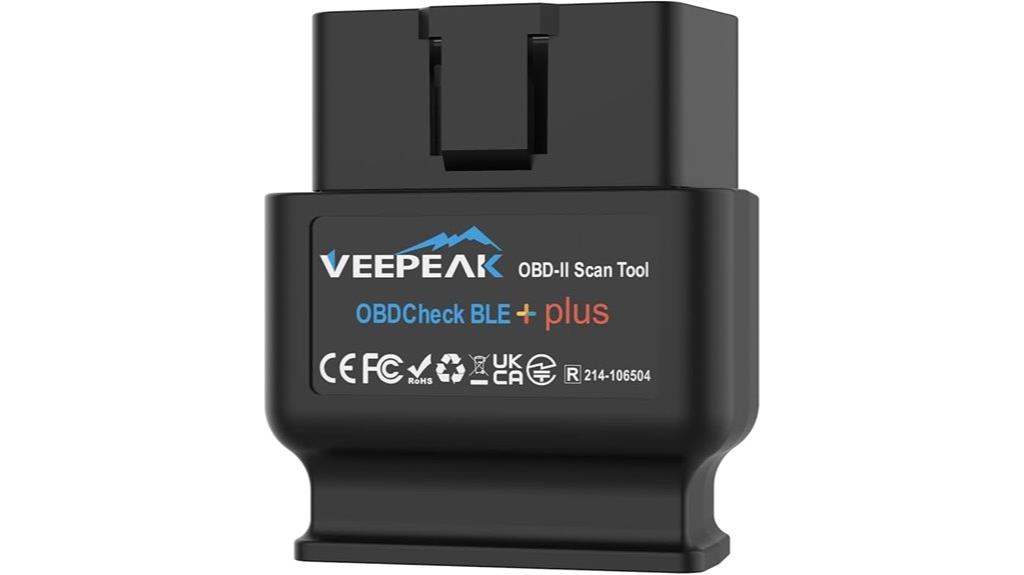
If you’re looking for a reliable Bluetooth OBD II scanner compatible with both iOS and Android devices, the Veepeak OBDCheck BLE+ stands out as an excellent choice. It supports all U.S.-sold cars and light trucks since 1996, with specific apps needed for BMW models from 2008 onward. It connects via Bluetooth LE for iOS and Classic Bluetooth for Android, offering diagnostics like trouble codes, live sensor data, and I/M readiness. Easy to set up, it comes with a carrying case and a one-year warranty. While features depend on vehicle and app, many users appreciate its accuracy and affordability for DIY diagnostics and maintenance.
Best For: DIY vehicle owners and automotive enthusiasts seeking a reliable, affordable Bluetooth OBD II scanner compatible with iOS and Android devices for troubleshooting and basic diagnostics.
Pros:
- Easy setup with quick Bluetooth pairing and straightforward operation
- Supports a wide range of diagnostic functions including trouble codes, live data, and I/M readiness
- Compatible with multiple third-party apps, offering flexibility for different vehicle makes and diagnostics needs
Cons:
- Advanced diagnostics like ABS, SRS, and manufacturer-specific data depend on vehicle and app, and may require additional purchases
- Not compatible with certain apps or older vehicle models, especially pre-2008 BMWs or specific app restrictions
- Service reset functions are not supported, limiting some maintenance capabilities
OBD2 Bluetooth Scanner for Car Diagnostic and Live Data
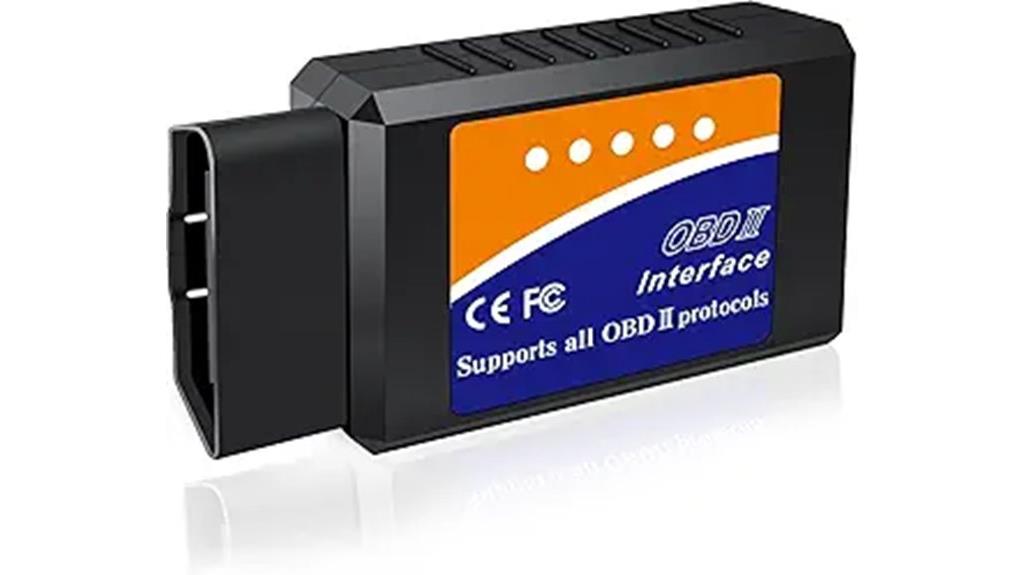
A Bluetooth OBD2 scanner is an excellent choice for DIY enthusiasts and car owners who want quick, affordable access to their vehicle’s diagnostic data. It supports most 1996+ vehicles, including gas and diesel models from brands like BMW, Ford, Toyota, and more. It reads and clears trouble codes, displays live sensor data such as RPM, coolant temp, and oxygen levels, and monitors vehicle readiness. Compatible with iOS, Android, and Windows, it works with popular apps like Torque and OBD Fusion. While setup can be tricky initially, proper configuration guarantees reliable performance. Overall, it’s a handy tool for quick diagnostics and ongoing vehicle monitoring.
Best For: DIY car enthusiasts and vehicle owners seeking affordable, quick diagnostics for most 1996+ gas and diesel vehicles with compatible apps.
Pros:
- Supports a wide range of 1996+ vehicles, including popular brands like BMW, Ford, and Toyota
- Reads and clears trouble codes while displaying live sensor data for comprehensive diagnostics
- Compatible with multiple platforms and apps such as Torque, OBD Fusion, and Car Scanner
Cons:
- Setup can be challenging, especially on iOS devices, requiring careful following of instructions
- Some users report connectivity issues and app bugs that may affect performance
- Build quality concerns and interface frustrations noted in certain reviews
OBD2 Bluetooth 4.0 Scanner for Cars

For anyone looking to quickly diagnose vehicle issues using their smartphone or tablet, the OBD2 Bluetooth 4.0 Scanner is an excellent choice. It offers a stable connection, fast data transfer, and low power consumption, making it easy for beginners to use. Compatible with most 1996+ US, EU, and Asian vehicles, it reads and clears error codes, resets check engine lights, and displays sensor data. Supporting iOS, Android, Windows, and Symbian, it transforms your device into a powerful diagnostic tool. With straightforward plug-and-play functionality and support for popular apps like Torque and DashCommand, it simplifies vehicle troubleshooting.
Best For: DIY car owners and beginners seeking an affordable, easy-to-use diagnostic tool to quickly identify vehicle issues using their smartphones or tablets.
Pros:
- Stable Bluetooth 4.0 connection with fast data transfer and low power consumption
- Compatible with a wide range of vehicles (1996+ US, EU, Asian) and supports multiple systems and protocols
- Supports various popular apps for comprehensive diagnostics and custom dashboards
Cons:
- Some users report connectivity difficulties and software glitches, especially on iOS devices
- Build quality concerns noted in reviews, potential durability issues
- Initial setup may be challenging for beginners without detailed instructions
OHP ENET OBD2 (Enet Cable + USB Type C)

The OHP ENET OBD2 (Enet Cable + USB Type C) stands out as an ideal choice for BMW enthusiasts and professional technicians who need a reliable, high-speed connection across multiple devices. It includes an Ethernet cable and a USB-C to Ethernet adapter, supporting BMW F-series, G-series, and some newer Mini models. Compatible with Android and iOS devices like Samsung phones, iPhone 15, and latest iPads, it works seamlessly with software such as Bimmercode, E-SYS, and Bimmerlink. Its compact aluminum design guarantees durability and heat dissipation, making it perfect for on-the-go diagnostics. Setup instructions are straightforward, with helpful troubleshooting tips available on the official website.
Best For: BMW enthusiasts and professional technicians seeking a reliable, high-speed OBD2 connection compatible with multiple devices and operating systems.
Pros:
- Supports a wide range of BMW models, including F-series, G-series, and newer Mini vehicles.
- Compatible with Android and iOS devices such as Samsung phones, iPhone 15, and latest iPads.
- Compact, durable aluminum design with efficient heat dissipation, ideal for portable use.
Cons:
- Requires Windows emulator apps like CrossOver, VirtualBox, VMware Fusion, or Parallels for Mac compatibility.
- Setup may involve troubleshooting steps like disabling Wi-Fi and enabling Airplane Mode.
- Limited information on compatibility with older BMW models or non-supported vehicle types.
Vgate vLinker FS Bluetooth OBD2 Diagnostic Scan Tool

If you’re seeking a reliable Bluetooth OBD2 scanner that works seamlessly across various vehicle types and device platforms, the Vgate vLinker FS stands out. It supports MS-CAN and five standard OBD-II protocols, making it compatible with 12V and 24V systems, including Ford proprietary networks. It works with iOS, Android, and Windows devices, allowing you to read and clear error codes, perform diagnostics, and even handle configuration tasks. With fast data transfer, support for advanced programming, and easy Bluetooth pairing, it offers a versatile and user-friendly experience. Users praise its stability and compatibility, especially with Ford trucks, making it a top choice for on-road diagnostics.
Best For: vehicle owners and DIY enthusiasts seeking a versatile, reliable Bluetooth OBD2 scanner compatible with multiple vehicle types and device platforms.
Pros:
- Supports MS-CAN and five standard OBD-II protocols for broad vehicle compatibility
- Fast data transfer rates up to 3 Mbps and support for advanced programming tasks
- Easy Bluetooth pairing and stable connectivity across iOS, Android, and Windows devices
Cons:
- Limited compatibility with MacOS via Parallels or similar virtual environments
- Some iOS apps may have restricted data access compared to desktop software
- Slightly larger size and weight compared to simpler OBD2 scanners
Bluetooth Adapter 5.0 aptX-HD for Audi with 30-pin Port Cable

Anyone with an older Audi model that features a 30-pin port can considerably upgrade their in-car audio experience using the Bluetooth Adapter 5.0 aptX-HD. This adapter connects directly to the car’s 30-pin interface, supporting models from 2010 to 2019 with MMI 3G/3G+ systems. It delivers high-quality wireless music streaming with aptX-HD, ensuring studio-grade sound clarity. Equipped with a CSR8675 chipset, it supports 24-bit resolution and low latency formats. Easy to install, it allows seamless pairing with iOS and Android devices, with intuitive controls via steering wheel and dashboard buttons. Overall, it’s a simple upgrade for richer audio in compatible older vehicles.
Best For: car owners with older Audi models featuring a 30-pin port seeking to upgrade their in-car audio with high-quality wireless streaming.
Pros:
- Supports high-resolution aptX-HD for studio-grade sound quality
- Easy to install and pairs seamlessly with iOS and Android devices
- Enables convenient control via steering wheel and dashboard buttons
Cons:
- Limited compatibility excludes Audi MMI 2G systems (2004-2009)
- Some users report initial connectivity challenges or product mismatches
- Apple devices may not support aptX-HD over Bluetooth without a Lightning connection
BlueDriver Bluetooth OBDII Scan Tool for iPhone & Android
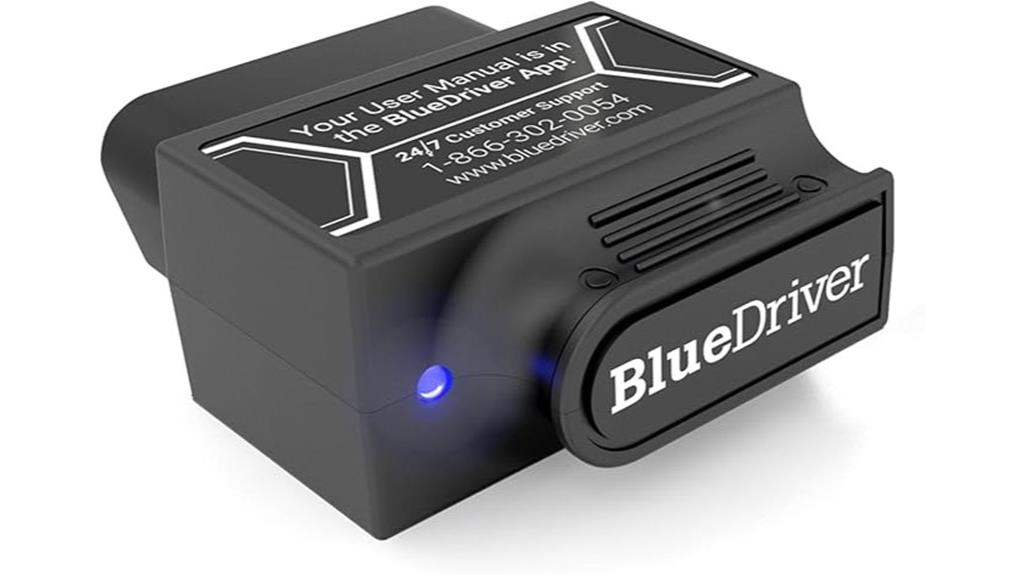
For DIY enthusiasts and everyday drivers seeking professional-grade diagnostics without the dealership price, the BlueDriver Bluetooth OBDII Scan Tool stands out as an excellent choice. It connects easily via Bluetooth to iOS and Android devices, supporting all gas-powered cars from 1996 onward. It reads and clears a wide range of codes, including check engine, ABS, and airbags, while offering detailed repair reports, live data, and freeze frame snapshots. The user-friendly app includes repair videos and step-by-step instructions, making troubleshooting straightforward. With no subscription fees and a high customer rating, BlueDriver provides reliable, all-inclusive diagnostics that save time and money.
Best For: DIY car enthusiasts and everyday drivers seeking professional-grade diagnostics without the cost of dealership visits.
Pros:
- Supports a wide range of vehicle makes and models from 1996 onward, including gas-powered cars.
- Provides comprehensive diagnostic information, including live data, repair reports, and code clearing.
- User-friendly app with repair videos, step-by-step instructions, and no subscription fees.
Cons:
- Pairing and connection issues may require technical support for some users.
- Limited to gas-powered vehicles; not compatible with diesel or electric cars.
- Some advanced features might be less suitable for professional mechanics seeking in-depth diagnostics.
Factors to Consider When Choosing Bluetooth OBD Adapters
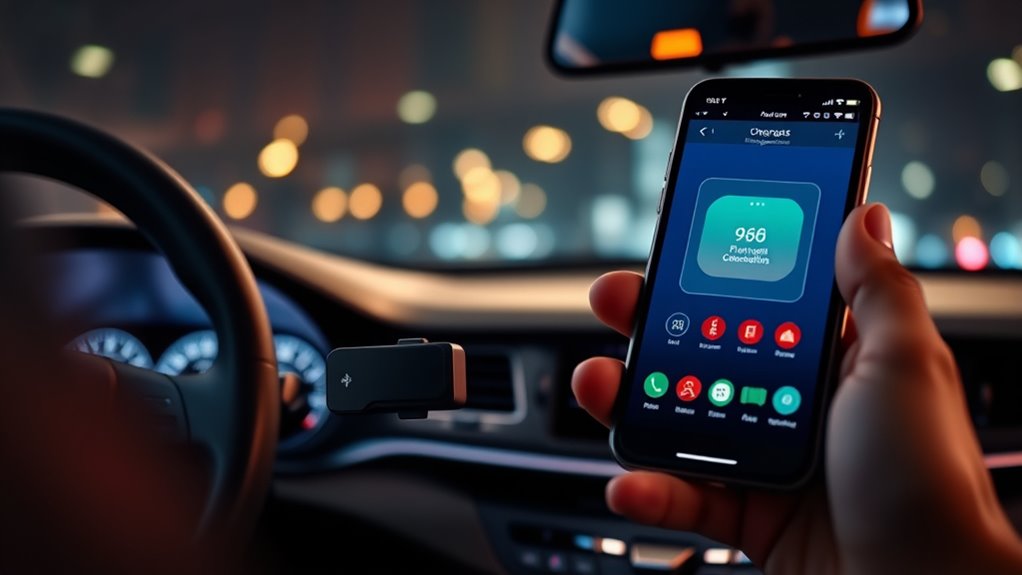
When choosing a Bluetooth OBD adapter, I focus on how well it works with my vehicle and the diagnostic functions I need. I also consider how stable the connection is and whether the app offers useful features, all while staying within my budget. These factors help me pick an adapter that’s reliable and fits my specific requirements.
Compatibility With Vehicle Types
Choosing a Bluetooth OBD adapter that’s compatible with your vehicle is essential to guarantee accurate diagnostics and seamless connectivity. First, make certain it supports vehicles manufactured after 1996, as OBDII became standard then for most US, Canadian, and Asian models. Check if the adapter works with your vehicle’s fuel type—gasoline, diesel, hybrid, or electric—since some adapters don’t support hybrids or EV systems. You’ll also need to verify if it supports your vehicle’s specific protocols, like ISO9141, ISO14230, J1850 PWM/VPW, or CAN-BUS. Compatibility with your make and model is critical, especially for European brands like BMW, which may require special protocols. Finally, make sure the adapter matches your vehicle’s electrical system voltage, whether 12V or 24V, to avoid damage and connection issues.
Supported Diagnostic Functions
Supported diagnostic functions are a key factor to contemplate because they determine what insights you can gain from your vehicle. Most Bluetooth OBD adapters can read and clear trouble codes, give real-time sensor data, and perform I/M readiness tests. Some also support freeze frame data, capturing vehicle conditions at the moment a fault occurs, which is highly useful. More advanced models may offer manufacturer-specific info, including ABS, SRS, TPMS, and transmission data, but this depends on your vehicle and the app you use. It’s essential to recognize that service reset functions are usually not supported, limiting maintenance tasks. Compatibility with these features varies widely, so I recommend checking whether the adapter supports the diagnostic functions you need for your specific vehicle make and model.
Device Connectivity Stability
Stable Bluetooth connectivity is essential for reliable vehicle diagnostics because it guarantees that data transfers smoothly without interruptions. A strong connection minimizes the risk of drops during critical diagnostics, saving time and preventing errors. Compatibility with Bluetooth versions like 4.0, 4.2, 5.0, or 5.1 markedly impacts connection stability and speed. Reliable pairing protocols and solid firmware support help maintain consistent links, especially in environments crowded with other wireless devices. Signal interference from Wi-Fi networks, electronic gadgets, or metal obstacles can weaken signals and cause instability. To optimize stability, I recommend keeping the adapter within the recommended range and avoiding obstructions. Proper placement and selecting adapters with proven connectivity performance are key to ensuring a seamless diagnostic experience.
App Compatibility and Features
Ever wonder if your Bluetooth OBD adapter will work seamlessly with your preferred diagnostic app? It’s vital to verify compatibility first. Make certain the adapter supports apps like Torque, OBD Fusion, or BimmerCode, so you can access all the features you need. Check if it handles basic functions like reading and clearing trouble codes, as well as advanced options like live sensor data or vehicle-specific diagnostics. Also, see if the app requires additional purchases or subscriptions for full functionality. Confirm that the Bluetooth version (BLE 4.0, 4.2, or 5.1) matches your device for smooth connectivity and fast data transfer. Finally, verify compatibility with your vehicle’s make and model, especially if you need specialized diagnostics like ABS or hybrid system monitoring.
Budget and Value Considerations
Are you trying to find a Bluetooth OBD adapter that offers the best balance between cost and features? First, set your budget and compare the options within that range to guarantee you’re getting good value. Cheaper models might save you money upfront but often come with limited functionality, slower data transfer, or shorter lifespans, which could cost you more long-term. Consider the diagnostic capabilities and vehicle compatibility—more expensive adapters usually support more cars and advanced features. Don’t forget to read customer reviews to gauge reliability and overall value. Also, factor in any additional costs, like apps or subscriptions needed for full diagnostics. Balancing price with features is key to choosing an adapter that meets your needs without overspending.
Frequently Asked Questions
Are Bluetooth OBD Adapters Compatible With All Vehicle Makes and Models?
You’re wondering if Bluetooth OBD adapters work with all vehicle makes and models. I’ve found that most adapters are compatible with a wide range of cars, but not every single one. It depends on the connector type and the vehicle’s electronic system. Always check the specifications before buying to make sure it’ll work with your specific car. It’s a simple step that saves you time and frustration.
How Secure Is the Data Transmission via Bluetooth OBD Adapters?
Ever wondered how safe your car’s data really is? I’ve looked into Bluetooth OBD adapters, and here’s the scoop—I was surprised at how secure they can be. Most use strong encryption protocols, making hacking attempts extremely difficult. Still, it’s wise to choose reputable brands and keep your device’s firmware updated. Trust me, your vehicle’s data can stay private if you stay vigilant and select quality adapters.
What Is the Typical Lifespan of a Bluetooth OBD Adapter?
When it comes to the lifespan of a Bluetooth OBD adapter, I find they usually last around 3 to 5 years with proper use. Factors like build quality, frequency of use, and exposure to elements can affect longevity. I recommend choosing a reputable brand and handling it carefully to guarantee it stays reliable longer. Regular updates and gentle handling help maximize its lifespan, so you get the most out of your investment.
Can Bluetooth OBD Adapters Be Used for Real-Time Vehicle Monitoring?
Sure, I can tell you that Bluetooth OBD adapters are great for real-time vehicle monitoring. They connect wirelessly to your smartphone or tablet, allowing you to see live data like speed, RPM, and fuel efficiency. I’ve used them myself and find them incredibly useful for keeping an eye on my car’s health on the go. Just make sure to choose a reliable adapter for accurate, instant updates.
Do Bluetooth OBD Adapters Require an Internet Connection for Operation?
Bluetooth OBD adapters don’t need an internet connection to work. I connect them directly to my vehicle’s OBD port and pair them with my smartphone or tablet. All the data is transmitted locally, allowing me to monitor engine performance, check error codes, and reset alerts without relying on Wi-Fi or mobile data. An internet connection is only necessary if I want to access cloud-based features or update the app or firmware.
Conclusion
Choosing the right Bluetooth OBD adapter is like finding the perfect key to access your car’s secrets. With so many options in 2025, you’ll want one that fits your needs and device compatibility. Think of it as arming yourself with a trusty toolkit for car diagnostics, making troubleshooting a breeze. No matter which one you pick, you’re turning your car into a smart companion, ready to tell you its stories whenever you ask.









